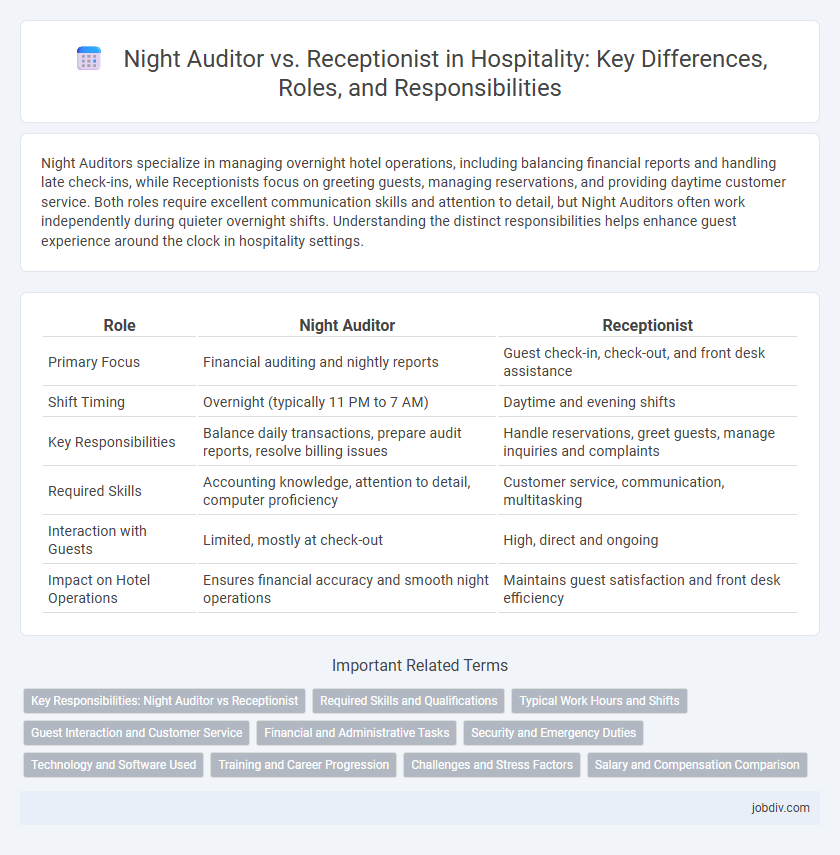Night Auditors specialize in managing overnight hotel operations, including balancing financial reports and handling late check-ins, while Receptionists focus on greeting guests, managing reservations, and providing daytime customer service. Both roles require excellent communication skills and attention to detail, but Night Auditors often work independently during quieter overnight shifts. Understanding the distinct responsibilities helps enhance guest experience around the clock in hospitality settings.
Table of Comparison
| Role | Night Auditor | Receptionist |
|---|---|---|
| Primary Focus | Financial auditing and nightly reports | Guest check-in, check-out, and front desk assistance |
| Shift Timing | Overnight (typically 11 PM to 7 AM) | Daytime and evening shifts |
| Key Responsibilities | Balance daily transactions, prepare audit reports, resolve billing issues | Handle reservations, greet guests, manage inquiries and complaints |
| Required Skills | Accounting knowledge, attention to detail, computer proficiency | Customer service, communication, multitasking |
| Interaction with Guests | Limited, mostly at check-out | High, direct and ongoing |
| Impact on Hotel Operations | Ensures financial accuracy and smooth night operations | Maintains guest satisfaction and front desk efficiency |
Key Responsibilities: Night Auditor vs Receptionist
Night Auditors manage overnight hotel operations, combining accounting tasks such as balancing daily transactions with guest service duties like check-ins and check-outs during late hours. Receptionists primarily handle daytime front desk operations, including guest reservations, inquiries, and coordinating with other hotel departments to ensure smooth service. Both roles require strong customer service skills but differ in workload emphasis, with Night Auditors focusing more on financial reporting and Receptionists on guest relations and communication.
Required Skills and Qualifications
Night Auditors require strong accounting skills, proficiency in hotel management software, and the ability to perform end-of-day financial reconciliations, often holding certifications in hospitality management or accounting. Receptionists need excellent communication, customer service abilities, and multitasking skills, typically possessing a high school diploma or equivalent with experience in front desk operations. Both roles demand attention to detail, problem-solving capabilities, and a professional demeanor to ensure smooth hotel operations.
Typical Work Hours and Shifts
Night Auditors typically work overnight shifts, covering hours from late evening to early morning, often between 11 PM and 7 AM, ensuring hotel accounting and guest services run smoothly during quieter hours. Receptionists usually have daytime or evening shifts, ranging from early morning to late evening, generally from 7 AM to 11 PM, handling guest check-ins, inquiries, and front desk operations. Shift patterns vary by hotel size and location, with night auditors focusing on nightly audit reports and receptionists managing peak guest interactions.
Guest Interaction and Customer Service
Night Auditors handle guest interactions primarily during overnight hours, balancing front desk responsibilities with financial auditing tasks to ensure smooth operations. Receptionists focus on daytime customer service, managing check-ins, check-outs, and immediate guest needs with a strong emphasis on personal interaction. Both roles are essential for maintaining high standards of hospitality, yet Night Auditors require a unique blend of customer service and accounting skills to support seamless guest experiences around the clock.
Financial and Administrative Tasks
Night auditors specialize in reconciling daily financial transactions, balancing accounts, and preparing detailed reports to ensure accurate revenue tracking. Receptionists primarily handle guest check-ins, reservations, and customer service, with limited involvement in administrative financial duties. The night auditor's role bridges front desk operations with accounting, providing critical oversight during overnight shifts in hospitality management.
Security and Emergency Duties
Night auditors are responsible for securing hotel premises during overnight hours, conducting thorough checks to ensure all access points are locked and monitoring security systems for any suspicious activity. Receptionists primarily manage guest check-ins and inquiries but also play a crucial role in emergency response by promptly communicating incidents to management and coordinating guest safety. Night auditors often receive specialized training in emergency protocols, enabling them to act swiftly in crises such as fire alarms or medical emergencies when fewer staff are present.
Technology and Software Used
Night auditors primarily use property management systems (PMS) like Opera or Maestro to reconcile daily financial transactions and generate reports, ensuring accurate end-of-day accounting. Receptionists rely on front desk software such as Cloudbeds or RoomRaccoon to manage reservations, guest check-ins, and room assignments in real time. Both roles increasingly incorporate mobile check-in technology and contactless payment systems to enhance guest experience and operational efficiency.
Training and Career Progression
Night auditors receive specialized training in accounting and financial reconciliation alongside front desk operations, enhancing their skills in both guest services and fiscal management. Receptionists typically start with fundamental customer service training, focusing on check-in/out procedures, communication, and reservation systems, which lays the groundwork for front office career advancement. Career progression for night auditors often leads to supervisory roles in hotel finance or operations, while receptionists may advance to front desk manager or guest relations positions, reflecting distinct pathways shaped by their initial training focus.
Challenges and Stress Factors
Night auditors face challenges including balancing accounting tasks with guest service during overnight hours, often working alone with limited support, which increases stress due to isolation and responsibility for financial accuracy. Receptionists manage high guest interaction volume, multitasking between check-ins, check-outs, and inquiries, leading to stress from constant customer engagement and peak time pressure. Both roles demand strong problem-solving skills and emotional resilience to handle unexpected issues and maintain guest satisfaction in a fast-paced environment.
Salary and Compensation Comparison
Night auditors typically earn between $30,000 and $45,000 annually, reflecting their dual role in accounting and front desk operations, while receptionists in hospitality generally make $25,000 to $35,000 per year. Night auditors often receive additional compensation through overnight shift differentials, enhancing their overall salary compared to standard daytime receptionists. Benefits and bonuses vary by hotel size and location, but night auditors tend to have higher total compensation due to their specialized financial responsibilities.
Night Auditor vs Receptionist Infographic

 jobdiv.com
jobdiv.com